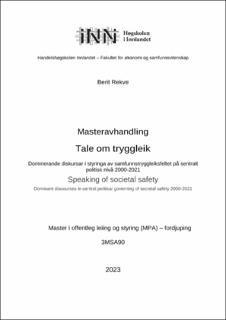| dc.description.abstract | Korleis talar regjeringa og Stortinget om tryggleik?
Hovudspørsmålet for studien er: Kva for diskursar dominerer styringa av samfunnstryggleiks-feltet på sentralt politisk nivå, og korleis endrar dei seg i perioden 2000-2021?
For å få vita kva for diskursar som dominerer, har eg leita etter kva for diskursar som finst. Dette er delt i to undertema med kvart sitt forskingsspørsmål, det første med ei fagspesifikk tilnærming, medan det andre er meir allment forvaltningspolitisk.
Kva for samfunnstryggleiksfagleg rasjonale viser seg i diskursane i styringa av feltet? Eg søkjer å finna spor av teoretiske grunngjevingar frå tryggleiksstyring, med vekt på teori om normale ulykker, høgpålitelege organisasjonar, og nærskylde konsept. Eg ser òg på om det er tema eller omgrep som har særleg merksemd eller endring i perioden.
Kva slags styringslogikk trer fram? Med utgangspunkt i organisasjonsteori har eg knytta saman konsept i teorigrupper som eg nyttar i leitinga etter styringslogiske diskursar. Desse er New Public Management, logistikk og effektivitetslogikkar; gjenstridige problem, organisasjon, samordning og ansvarsprinsippet, og lov og kontroll som styringslogikk.
Det empiriske materialet tek utgangspunkt i utgreiinga til Sårbarhetsutvalget frå 2000. Vidare har eg analysert dei seks stortingsmeldingane om samfunnstryggleik, innstillingane frå komiteane og plenumsordskifta i Stortinget. Delar av nokre offentlege utgreiingar er òg med. Dette er ein kvalitativ dokumentstudie som inneber nærlesing for å finna representasjonar som formar diskursar. Desse er òg sett i samband med diskursteori og innslag frå retorikk.
Hovudfunnet i studien er at ansvars- og samordningsdiskursen framstår som dominerande. Det ser ut til at Sårbarhetsutvalgets premiss om at styringa er fragmentert, er akseptert, men at ansvarsprinsippet ligg fast, sjølv om ein gjer ymse grep for samordning. Frå den samfunnstryggleiksfaglege sida står det diskursivt uomstridt sidan Sårbarhetsutvalget at samfunnet er sårbart.
Eit endringsfunn er at styresmaktene ser ut til å tala meir i tråd med «føre var»- enn «i rette tid»-prinsippet innanfor logistikk og forsyningsberedskap i ljos av koronapandemien. Eg finn med det at ein i 2021 stod nærare Sårbarhetsutvalgets kritiske forståing for sårbarheitene gjensidige avhengigheiter og globalisering utgjer. | |
| dc.description.abstract | How do the Norwegian government and parliament (the Storting) speak about societal safety?
The principal object of study of this thesis is dominant discourses in the governing of societal safety issues by lawmakers and central government bodies, and how they change in the period from 2000 to 2021.
To be able to characterize any discourse as dominant, my first step was to make an inventory of identifiable discourses. These were divided into two subthemes, each associated with a specific research question; the first one technical and technological, the other of a more general organizational, managerial or administrative nature.
What is the technical and technological rationale of discourses that appear in the governing of social safety issues? Here I seek to find evidence of theoretical reasoning based on security management, with emphasis on normal accident theory, high reliability organizations and related concepts. In addition, I look for topics or concepts that attract particular interest or show any change in the course of the period.
What kind of logic of an organizational, managerial or administrative nature appears in societal safety discourses? With organizational theory as a starting point, I have combined concepts into theory groups that I use in my search for evidence of such logic: New Public Management, logistics and efficiency, wicked problems, organization, coordination and the principle of responsibility, and the logic of legislation and control.
The empirical material takes as its starting point the Norwegian Official Report submitted by the commission on vulnerability (‘Sårbarhetsutvalget’) in 2000. Furthermore, I have analyzed six reports to the Storting (white papers) concerning societal safety, the recommendations of the standing committees and the debates in the plenary Storting. Parts of some other official reports are also included. This is a qualitative document study that required close reading to find representations forming discourses, with connections also made to discourse theory and rhetorical elements.
The main findings of this study are that the responsibility and coordination discourse is the most dominant. The premise of Sårbarhetsutvalget that the governing of societal safety issues is fragmented seems to be accepted, however the principle of responsibility is not challenged, although some coordination measures are taken. Where the technical and technological aspects of societal safety are concerned, the ‘vulnerable society’ discourse is both dominant and undisputed.
There is evidence of change in the period under scrutiny, as the authorities’ discourse, from the onset of the coronavirus pandemic, leaned more heavily towards the precautionary principle, away from ‘just in time’ practices in the areas of logistics and supply security. I conclude that this shows that in 2021, the authorities had moved closer to the critical stance of Sårbarhetsutvalget concerning the vulnerabilities of interdependencies and globalization. | |

